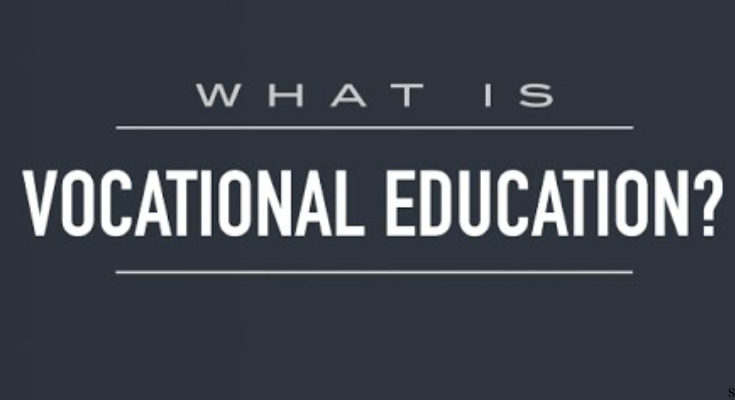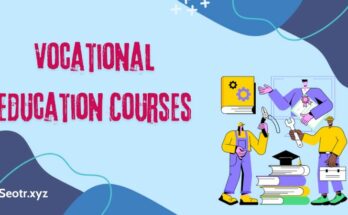In the ever-evolving landscape of education, vocational education stands as a crucial pillar, offering unique avenues for individuals to acquire practical skills and hands-on experience. Unlike traditional academic paths, vocational education focuses on preparing individuals for specific careers, ensuring they are equipped with the practical knowledge and skills needed in the workforce. In this comprehensive exploration, we will delve into what is vocational education, its historical evolution, key principles, benefits, challenges, and its role in shaping the future of education and employment.
What is vocational education?

1. **Definition and Scope:**
Vocational education, also known as career and technical education (CTE), refers to educational programs and courses designed to prepare individuals for specific trades, crafts, or professions. Unlike academic education, which often emphasizes theoretical knowledge, vocational education emphasizes hands-on skills and practical training in a particular field.
2. **Historical Evolution:**
The roots of vocational education can be traced back to the apprenticeship system in medieval Europe, where craftsmen passed on their skills to apprentices. Over time, vocational education evolved to meet the changing needs of industries during the Industrial Revolution and beyond. In the 20th century, the concept gained further prominence as a response to the demand for skilled workers in various sectors.
Key Principles of Vocational Education:
1. **Practical Skill Development:**
At the core of vocational education is the emphasis on practical skill development. Students engage in hands-on learning experiences that directly relate to the tasks and responsibilities they will encounter in their chosen professions.
2. **Industry-Relevant Curriculum:**
Vocational education programs are designed in collaboration with industry experts to ensure that the curriculum remains relevant to the current needs and trends of the workforce. This partnership between educational institutions and industries enhances the employability of graduates.
3. **Work-Based Learning:**
Work-based learning, including internships, apprenticeships, and on-the-job training, is a fundamental component of vocational education. This approach allows students to apply theoretical knowledge in real-world settings, fostering a seamless transition from education to the workplace.
Benefits of Vocational Education:

1. **Career Readiness:**
Vocational education equips individuals with the practical skills and knowledge necessary for specific careers. Graduates are often more immediately employable, as they possess hands-on experience that complements their academic qualifications.
2. **Diverse Career Pathways:**
Vocational education opens up a wide array of career pathways across various industries, including healthcare, information technology, manufacturing, hospitality, and more. This diversity allows individuals to explore and choose fields that align with their interests and aptitudes.
3. **Reduced Time to Employment:**
Unlike traditional academic programs that may take several years to complete, vocational education programs are often shorter in duration. This allows individuals to enter the workforce sooner, reducing the time it takes to start earning and contributing to the economy.
4. **Meeting Industry Demands:**
Vocational education programs are designed in close collaboration with industry stakeholders. This ensures that graduates are equipped with the skills and knowledge that are directly applicable to the demands of the job market.
Challenges and Criticisms:
1. **Perceived Stigma:**
In some societies, there exists a perception that vocational education is a secondary or inferior option compared to traditional academic routes. Overcoming this stigma is essential to promote the value and importance of vocational education.
2. **Changing Technological Landscape:**
The rapid evolution of technology poses a challenge to vocational education programs, as they must continually adapt to incorporate the latest advancements in various industries. This requires a commitment to staying current and relevant.
3. **Resource Allocation:**
Adequate funding and resources are crucial for the success of vocational education programs. Insufficient investment may result in outdated equipment, limited access to practical experiences, and a diminished overall quality of education.
Role of Vocational Education in Shaping the Future:

1. **Meeting the Skills Gap:**
In an era characterized by rapid technological advancements, there is a growing gap between the skills demanded by industries and the skills possessed by the workforce. Vocational education plays a pivotal role in bridging this gap by providing targeted, industry-specific training.
2. **Promoting Lifelong Learning:**
Vocational education encourages a mindset of lifelong learning. As industries evolve, individuals with vocational training are better equipped to adapt to changes and acquire new skills throughout their careers.
3. **Global Economic Competitiveness:**
Nations that invest in a robust vocational education system enhance their global economic competitiveness. A skilled and adaptable workforce contributes to innovation, productivity, and overall economic growth.
4. **Fostering Innovation:**
Vocational education promotes a culture of innovation by encouraging problem-solving and critical thinking. Hands-on experiences and exposure to real-world challenges nurture creativity and entrepreneurship among students.
Conclusion:
Vocational education stands as a dynamic and essential component of the educational landscape, offering a unique pathway for individuals to enter the workforce with practical skills and knowledge. As societies grapple with the challenges of a rapidly changing global economy, the role of vocational education becomes increasingly significant. By recognizing its benefits, addressing challenges, and adapting to the evolving needs of industries, vocational education has the potential to shape a future where individuals are not only academically prepared but also equipped with the practical skills needed for success in their chosen careers. As we navigate the complexities of the 21st century, vocational education emerges as a beacon of empowerment, fostering a skilled, adaptable, and resilient workforce poised to meet the challenges of tomorrow.



